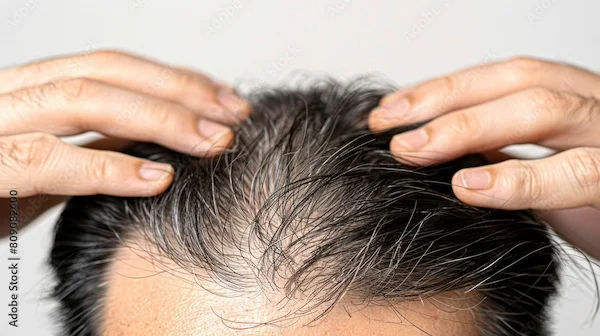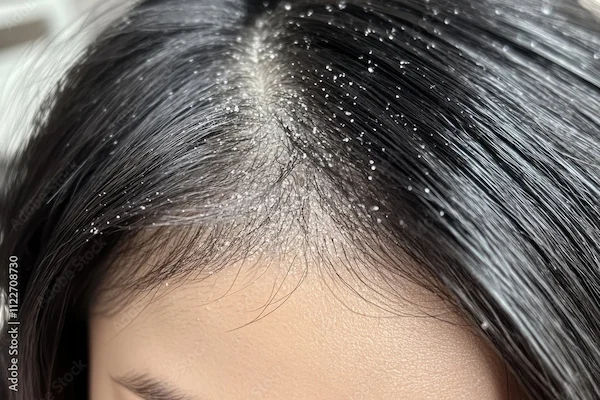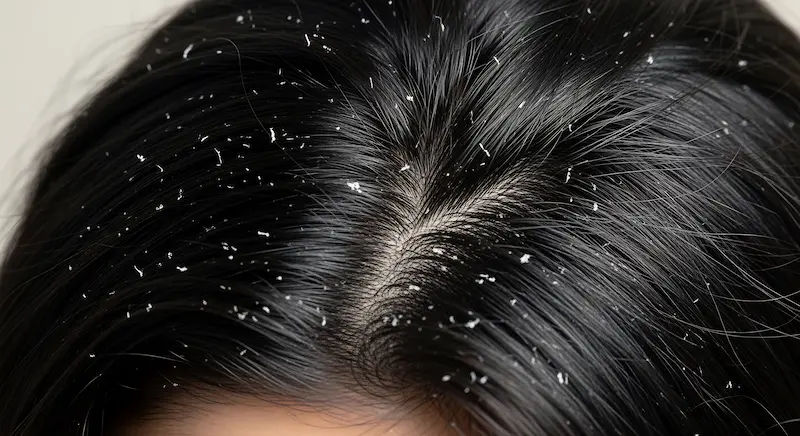How to Reduce DHT: Natural Methods, Medications & More
Learn how to reduce DHT naturally and medically to prevent hair loss and maintain hormonal balance. Discover diet tips, lifestyle changes, and effective treatments for managing DHT levels.

Written by Dr. Shaik Abdul Kalam
Reviewed by Dr. D Bhanu Prakash MBBS, AFIH, Advanced certificate in critical care medicine, Fellowship in critical care medicine
Last updated on 13th Jan, 2026

Hair growth is significantly influenced by Dihydrotestosterone (DHT). However, excessive amounts of DHT can suppress hair growth and lead to skin problems, prostate enlargement and other complications. Now, high DHT levels can occur mainly due to genetics and hormonal imbalances.
This article discusses the symptoms of elevated DHT levels, natural and medical treatments for reduction, lifestyle changes and more.
Causes of High DHT Levels
Following are some of the major causes of high DHT levels:
1. Genetics
It has been determined that genetics greatly determine an individual’s hair health. Since genetics determine DHT levels, individuals with a family history of male pattern baldness tend to have a genetic disposition for higher DHT levels.
2. Hormonal Imbalances
DHT levels can be influenced by various hormonal disorders that disrupt the body's natural balance.
PCOS: In some women, excess DHT may be the result of certain medical conditions, such as polycystic ovary syndrome (PCOS). This can lead to elevated androgen levels, resulting in excess DHT. Symptoms of hormonal imbalances include infrequent menstrual cycles, cystic acne and hirsutism.
Adrenal Disorders: Adrenal disorders cause the adrenal glands to produce increased levels of androgens, which elevate DHT production.
Testosterone Fluctuations in Men: High or imbalanced testosterone can lead to more DHT conversion, contributing to hair loss and oily skin.
3. Lifestyle Factors
Daily habits and dietary choices can also impact DHT levels.
High-sugar Diets: Excess sugar spikes insulin levels, which can raise androgen production. This, in turn, increases DHT levels.
Excessive Protein Intake: While protein is essential for hair, excessive protein intake may elevate testosterone levels.
Lack of Exercise: A sedentary lifestyle can contribute to weight gain and hormone imbalances, which can potentially increase DHT levels.
Symptoms of Elevated DHT Levels
To identify elevated DHT levels, keep track of the following symptoms:
Hair Loss and Thinning: DHT binds to receptors in hair follicles. This causes hair to grow thinner and shorter. Over time, this can result in the cessation of hair growth.
Skin Issues Like Acne: Dihydrotestosterone increases oil production in the skin, which can clog pores and lead to acne breakouts.
Increased Body Hair Growth: While DHT may cause scalp hair to thin, it can also lead to more hair growth on other parts of the body, like the chest, back, or face.
Oily Skin: Higher DHT levels can overstimulate the sebaceous glands. This may lead to persistently oily skin.
Enlarged Prostate: In men, excess DHT can contribute to an enlarged prostate, a condition known as benign prostatic hyperplasia (BPH). This may cause urinary issues over time.
Consult Top Doctors for Your Symptoms
Natural Ways to Reduce DHT
Certain foods and herbal supplements may help lower DHT levels and prevent hair loss:
Green tea is rich in Epigallocatechin-3-gallate (EGCG), which protects hair follicles and reduces shedding.
Coconut oil contains lauric acid, which blocks DHT production.
Onions, spinach, kale, and apples may help lower DHT.
Turmeric is another option. Its active compound, curcumin, may inhibit the enzyme that produces DHT.
Pumpkin seeds are packed with zinc, iron, and magnesium.
Edamame and other soy products contain isoflavones, which may also help lower DHT levels naturally.
Herbal supplements can further support hair health. While these remedies can be beneficial, it’s best to consult a healthcare professional before making major dietary changes or taking supplements.
Medical Treatments for DHT Reduction
Following are some prescription medications which healthcare providers usually recommend for reducing DHT levels:
Finasteride is popularly used to treat hair loss by blocking the binding of DHT to its receptors on hair follicles.
Another option is minoxidil, which is directly applied to the scalp. It improves blood vessel dilation to facilitate hair growth.
Other medications that can help lower DHT are biotin, pygeum bark, pumpkin seed oil, caffeine, and vitamin B.
Here are some possible side effects of the above-mentioned medication:
Taking finasteride might trigger a few side effects, including diminished libido and alterations in mood, combined with trouble maintaining erections.
Minoxidil use may lead to scalp skin irritations and additional facial hair growth.
High doses of biotin can disrupt several medical screening methods.
Pygeum bark and pumpkin seed oil tend to cause mild digestive problems for some individuals.
Lifestyle Changes to Manage DHT Levels
Following are some recommended lifestyle changes to manage DHT levels:
Chronic stress can disrupt DHT levels. The combination of meditation and yoga, along with deep breathing practices, can provide effective stress management.
Regular exercise helps keep hormones balanced. A well-planned exercise regimen is beneficial for long-term hormonal health and well-being.
Washing the scalp regularly prevents oil buildup that can lead to DHT-related acne and hair thinning. It is suggested to go for gentle, sulfate-free shampoos to avoid drying out the scalp.
Poor sleep can affect hair health. It is essential to aim for 7-9 hours of good sleep to help the body regulate hormones properly.
DHT and Hair Health
Over time, DHT weakens hair follicles and shortens the hair growth cycle. As a result, hair becomes finer until it eventually stops growing altogether. Here are a few tips to combat DHT:
Use DHT-Blocking Shampoos: Some shampoos contain ingredients that can help reduce DHT levels.
Incorporate Scalp Massages: Regular scalp massages improve blood circulation, which helps deliver essential nutrients to hair follicles. This enhances the effectiveness of DHT blockers.
Adopt a Healthy Diet: Foods rich in vitamins and minerals support hair growth and overall scalp health.
Avoid Tight Hairstyles: Minimising tension on the scalp allows hair to grow better.
Try Essential Oils: Oils like peppermint, rosemary, and pumpkin seed oil have shown the potential to support hair health.
Myths and Misconceptions About DHT
Here are a few common misconceptions related to DHT:
Myth 1: DHT-related hair loss only affects men.
Truth: DHT impacts both men and women, though the patterns differ. Men typically experience receding hairlines and crown baldness, while women see thinning at the top of the scalp.
Myth 2: DHT-induced hair loss is permanent.
Truth: Early intervention can lead to significant improvement. Treatments like finasteride and minoxidil help slow hair loss and encourage regrowth.
Myth 3: DHT blockers are unsafe or don’t work.
Truth: DHT blockers are clinically tested and proven effective. Side effects are usually mild and temporary.
Myth 4: Wearing hats causes hair loss.
Truth: Hats do not cause hair loss. Genetics and hormones are the primary factors behind baldness.
Myth 5: Natural remedies alone can block DHT.
Truth: Natural supplements like pumpkin seed oil and biotin support hair health. However, they work best alongside medical treatments, not as standalone solutions. Natural supplements should always be taken after consultation.
Alternate Therapies for DHT Management
In addition to conventional treatments, various alternative therapies may help regulate DHT levels and promote hair health. These approaches focus on restoring hormonal balance and strengthening hair follicles.
1. Acupuncture
It is a therapy that involves inserting thin needles into specific points on the body to restore balance. Some research suggests that acupuncture may influence testosterone levels, which could indirectly affect DHT production.
2. Ayurvedic Remedies
Certain ayurvedic remedies are believed to reduce DHT and prevent hair loss:
Bhringraj: Known as the ‘king of herbs’ for hair, it is believed to strengthen follicles and promote hair growth.
Amla: Packed with vitamin C and antioxidants, it helps prevent thinning of hair.
Neem: Known for its antibacterial and antifungal properties, neem helps maintain a clean, healthy scalp. This prevents hair follicle damage and promotes hair growth.
3. Homoeopathy
Some commonly recommended remedies for hair loss include:
Silicea: It is believed to strengthen hair, reduce dryness, and improve scalp health.
Kalium Carbonicum: It is suggested for hair thinning and brittleness, particularly in older adults.
Lycopodium: This is frequently used for early-stage balding and premature greying.
Conclusion
Although DHT is crucial for hair growth, elevated levels can lead to major issues, like hair loss and acne. Keeping in mind the symptoms and timely opting for treatment can be the ideal way to maintain optimum DHT levels.
Medical research has shown that finasteride, along with minoxidil, provides effective treatments to lower levels of DHT in the body. Natural options for lowering DHT include green tea, coconut oil and pumpkin seeds.
Furthermore, maintaining DHT levels involves both stress management and exercise, along with lifestyle changes. Getting approval from a healthcare professional is a must before making changes to diet, lifestyle or medications.
Consult Top Endocrinologists
Consult Top Endocrinologists
Dr Sumanth R
General Physician
2 Years • MBBS
Bengaluru
PRESTIGE SHANTHINIKETAN - SOCIETY CLINIC, Bengaluru

Dr. Amrutha G
General Physician/ Internal Medicine Specialist
10 Years • MBBS,DNB(family medicine), Diabetologist-CCEBDM,CCGDM
Bengaluru
Apollo Clinic, Sarjapur Road, Bengaluru

Dr. Nilotpal Mitra
General Physician/ Internal Medicine Specialist
20 Years • MBBS, PGDGM ( Geriatric Medicine), ACMDC (an Advance course in Diabetes and cardiovascular diseases from PHFI and WHF )
Kolkata
MCR SUPER SPECIALITY POLY CLINIC & PATHOLOGY, Kolkata

Dr. Anand Ravi
General Physician
2 Years • MBBS
Bengaluru
PRESTIGE SHANTHINIKETAN - SOCIETY CLINIC, Bengaluru
Dr Kalpana Dash
Endocrinologist
30 Years • M.B.B.S. , M.D. (GENERAL MEDICINE), D.N.B. in Endocrinology , D.M ( ENDOCRINOLOGY )
Raipur
Apollo Sugar Clinics, Raipur, Raipur
Consult Top Doctors for Your Symptoms
Dr Sumanth R
General Physician
2 Years • MBBS
Bengaluru
PRESTIGE SHANTHINIKETAN - SOCIETY CLINIC, Bengaluru

Dr. Amrutha G
General Physician/ Internal Medicine Specialist
10 Years • MBBS,DNB(family medicine), Diabetologist-CCEBDM,CCGDM
Bengaluru
Apollo Clinic, Sarjapur Road, Bengaluru

Dr. Nilotpal Mitra
General Physician/ Internal Medicine Specialist
20 Years • MBBS, PGDGM ( Geriatric Medicine), ACMDC (an Advance course in Diabetes and cardiovascular diseases from PHFI and WHF )
Kolkata
MCR SUPER SPECIALITY POLY CLINIC & PATHOLOGY, Kolkata

Dr. Anand Ravi
General Physician
2 Years • MBBS
Bengaluru
PRESTIGE SHANTHINIKETAN - SOCIETY CLINIC, Bengaluru
Dr Kalpana Dash
Endocrinologist
30 Years • M.B.B.S. , M.D. (GENERAL MEDICINE), D.N.B. in Endocrinology , D.M ( ENDOCRINOLOGY )
Raipur
Apollo Sugar Clinics, Raipur, Raipur



